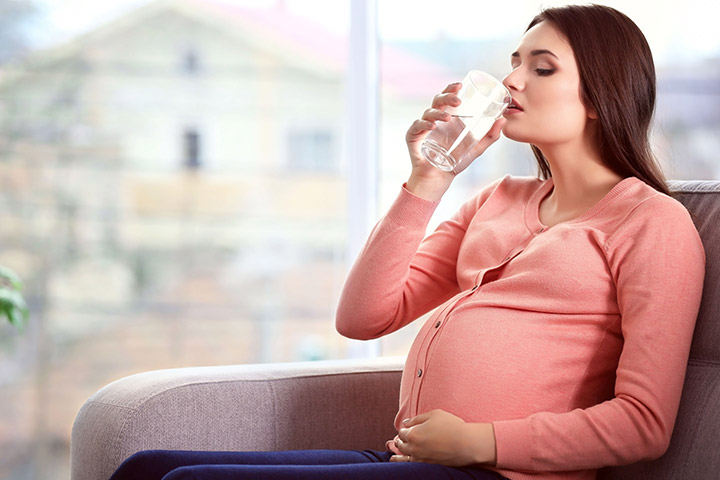Pregnant How Do I Know if I Am Dehydrated
Persistent thirstiness, lightheadedness, dry skin, and dry lips during pregnancy could mean you are dehydrated. If you experience these symptoms often, then it might impact your health. Therefore, you need to address the problem of dehydration as soon as possible.
MomJunction tells you about the effects of dehydration during pregnancy, how long it takes to recover, and the steps you may need to follow to avoid the problem.
What Causes Dehydration During Pregnancy?

Image: Shutterstock
Some of the common causes of dehydration during pregnancy are:
- Morning sickness: The condition appears during the first month and continues until the 14th or 16th week. The symptoms include nausea and vomiting that may disappear by the time you reach the second trimester. In some cases, women continue to have morning sickness beyond the second trimester.
[ Read: Morning Sickness During Pregnancy ]
The symptoms of morning sickness result in the loss of fluids and electrolytes from your body, causing dehydration. Moreover, nausea might not allow you to take fluids, making it harder for the body to regain the lost water (1).
- Severe morning sickness, also known as Hyperemesis Gravidarum: This condition is likely to happen in twin pregnancy (multifetal pregnancy). The symptoms, the same as those of morning sickness, remain throughout your pregnancy. Hyperemesis symptoms may also cause a severe loss of water and electrolytes. It could lead to fever, associated with nausea and vomiting, causing excessive sweating and dehydration (2).
- Diarrhea: Hormonal changes, dietary habits, and aversion to certain foods might lead to diarrhea, especially in the third trimester. This may also result in excessive loss of fluids and electrolytes (3).
[ Read: Diarrhea During Pregnancy ]
Some other factors that increase the risk of dehydration are:
- Lack of enough fluids: Your water intake level may depend on your trimester, activity level, weight, age, climate, and season. You might be more susceptible to dehydration during the warmer seasons.
- Air travel: Air in the cabin contains little moisture, and it may cause dehydration in your body (4). You should try to stay hydrated by drinking water when traveling. Airline rules may not allow carrying water bottles, but water is always available on the flight.
- Humidity: Hot weather and humidity might make you sweat, thereby leading to dehydration.
[ Read: Overheating During Pregnancy ]
- Vigorous exercise, especially in warm weather: This could make you sweat more, and when coupled with warm weather, could lead to dehydration.
- Fever: Body temperature that is higher than the normal could cause vomiting, loss of fluids, and pose a high risk of dehydration.
Signs And Symptoms Of Dehydration In Pregnancy
Once your body is depleted of water, it shows the symptoms and signs of being dehydrated. It is vital for you to recognize them (5).
- Thirst is the initial and the most unnoticed sign. Do not neglect if you are thirsty, listen to your body, and drink water. Maintain a routine of drinking water often, at least one glass an hour.
- Dizziness, vertigo, or lightheadedness, usually when standing, kneeling, or bending over. It happens due to the drop in blood pressure because of dehydration.
- Headache, especially migraines, is another prominent symptom of dehydration.
- Dark yellow urine with a strong odor. Clear urine means you are hydrating yourself properly.
- Dry mouth, nose, and skin that has lost its elasticity.
- Swollen tongue and chapped lips.
- Vomiting and nausea associated with abdominal pain and cramps.
Severe dehydration symptoms could be:
- Weakness
- Lack of concentration
- Constipation
- Piles
- Urinary tract infections
[ Read: Urinary tract infections During Pregnancy ]
Dehydration is a common problem that all of us experience. But could it lead to some serious complications during pregnancy?
What Are The Effects Of Dehydration During Pregnancy?
During the first trimester of pregnancy, dehydration might result in two risks:
Dehydration caused by morning sickness could lead to nausea, thus making the problem cyclic. When you feel nauseous, you do not feel like drinking more water and then get more nauseous. If a pregnant woman does not take enough fluids to avoid dehydration, she might have to be hospitalized for administering IV fluids (6).
During the second and third trimesters of pregnancy, dehydration might pose the risk of premature births. It is one of the reasons for premature contractions (7).
Treatment For Dehydration During Pregnancy
If you are experiencing dehydration symptoms, you could regain the lost fluids by consuming more water.
- Water, herbal tea, and decaffeinated coffee are good options.
- Fruit juices, soft drinks, milk, soups are acceptable but to a lesser extent than those above.
- Say no to alcoholic beverages.
[ Read: Benefits of Coconut Water During Pregnancy ]
How Much Water Should You Drink When Pregnant?
You need to drink eight to ten glasses of water every day (8). The quantity may include the beverages you consume, but, ideally, your first option should be plain water. Fluids such as juice, milk, tea, and coffee contain water and contribute to your fluid intake, but they also give you extra calories.
Your body needs extra water for performing additional functions during pregnancy.
When To Call A Doctor?
If dehydration is mild, it could be treated at home. But, if the above remedies do not work and you start experiencing severe symptoms, you should see your healthcare provider without any delay.
Your healthcare provider may advise you to get hospitalized so that a comprehensive line of tests is conducted to understand the underlying cause. Intravenous therapy is then prescribed, which is likely to replenish your body with essential water and nutrients.
Preventing Dehydration During Pregnancy
Fatigue caused due to dehydration might bring down the energy levels, making you feel dull and lethargic. To avoid this, make sure you drink enough water every day.
- Drinking a cup of water (150-180 ml), for every hour that you are awake, is an excellent way to get your daily quota of H2O.
- If you are finding it difficult to drink plain water, you may try adding a few slices of lemon, cranberry, watermelon, or orange to your everyday diet.
- Liquids such as soups, juices, and smoothies also are a part of the daily water requirement for the body. So, if you find drinking plain water boring, drink them instead.
- Avoid caffeine-related products, processed fruit juices, and sodas as the ingredients might increase your urine output, causing dehydration.
- Take extra care to keep yourself hydrated when performing strenuous exercises or spending a long time in hot weather.
If you are finding it tough to keep yourself hydrated, talk to your doctor and get the right advice.
Follow the preventive measures and dehydration remedies. If your dehydration is because of any above-mentioned risk factors, consult your healthcare provider or gynecologist.
References:
MomJunction's articles are written after analyzing the research works of expert authors and institutions. Our references consist of resources established by authorities in their respective fields. You can learn more about the authenticity of the information we present in our editorial policy.
The following two tabs change content below.
- Reviewer
- Author

Dr. Sangeeta Agrawal worked in Royal London, St. Bartholomew's, North Middlesex and Barnet General hospitals in London. Currently, she runs her own clinic in Mumbai. She is also attached to Bhatia Hospital, Breach Candy Hospital, Wockhardt Hospital, and Global Hospital. Her areas of expertise include obstetrics and gynecology, involving teenage care, antenatal, intrapartum, post-natal care, painless labor, fertility control, menopause... more

Rebecca is a pregnancy writer and editor with a passion for delivering research-based and engaging content in areas of fertility, pregnancy, birth, and post-pregnancy. She has been into health and wellness writing since 2010. She received her graduate degree in Biotechnology and Genetics from Loyola Academy, Osmania University and obtained a certification in 'Nutrition and Lifestyle in Pregnancy' from Ludwig... more
Pregnant How Do I Know if I Am Dehydrated
Source: https://www.momjunction.com/articles/serious-signs-symptoms-of-dehydration-during-pregnancy_0087995/
0 Response to "Pregnant How Do I Know if I Am Dehydrated"
Post a Comment